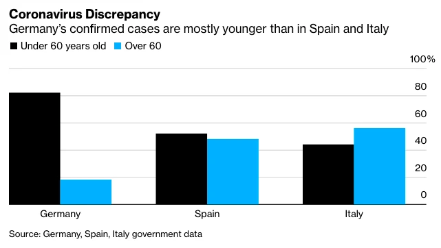What is the Mystery of Germany's Low Coronavirus Fatality Rate?
As the Coronavirus pandemic has spread across Europe, Italy has seen mortality rates approaching 10% while France and the UK have reported close to 5%.
But, one outlier is Germany where despite having over 34,000 reported cases among their citizens, only 175 have lost their lives to the virus.
Experts have been quick to point to a German testing system that has been extremely successful. Germany instituted testing among many of its member states after the CDC equivalent, the Robert Koch institute, recommended to do so.
The head of the Robert Koch institute, Lothar Wieler, bragged about Germany’s testing, "We don't know exactly how many unknown cases there are, but we estimate that this unknown number is not very high," Wieler said. "The reason is simple. We issued recommendations in mid-January about who should be tested and who shouldn't be tested."
Additionally, Christian Drosten, director of the institute of virology at Berlin's Charité hospital told NPR News, "I believe that we are just testing much more than in other countries, and we are detecting our outbreak early."
Monitoring an entire country’s population, especially in the case of Germany’s 82 million citizens, is extraordinarily difficult. The European Centre for Disease Prevention and Control put out a statement saying “Detailed surveillance is challenging in such rapidly evolving epidemic situations.”
Germany’s healthcare system is not centrally-run. Each of the 16 federal states of Germany has autonomy for its own healthcare. The national health ministry can only recommend a course of action, it can’t enforce. Nevertheless, member states were quick to adopt the formal recommendation of mass testing which apparently hit 120 thousand people per week starting in early February according to Drosten. Other large nations did not reach the approximately 1% testing level that Germany achieved. By including more asymptomatic carriers of the virus, the mortality rate would be lower.
Others point to a healthcare infrastructure that is far superior to any other country. In fact, Germany does have three times as many ICU beds as Italy. And Germany’s government, like Japan’s, covers 80% of medical expenses. This figure leads the EU, except for the minuscule state of Luxembourg.
Germany hasn’t even issued a stay at home quarantine as the United States, England, France, India and many other countries have done. Their citizens have been playing sports and going to work.
Could it be a difference in demographics? A stark difference was reported by Bloomberg: “just 18% of German cases involve people over 60 (the group most at risk) while 56% of Italian cases fall into that category. In Italy, 74% of those who’ve tested positive are over 50. In Germany, 82% of cases are people under 60.” So could it be a question of spreading throughout a younger demographic in Germany?

But the simple answer might be that many Germans have died from the virus without their deaths being attributed to the virus. Germany does not have a national policy of testing their dead, while France and Italy do.
So if Germany is not testing everyone who died with Coronavirus-like symptoms, how can their data be trusted in any way?
Is the New Coronavirus Drug a Cure?
What is the Mystery of Germany's Low Coronavirus Fatality Rate?
The World Will Be More Technologically Advanced After the COVID-19 Pandemic
Why has the Coronavirus Not Exploded in Japan?
Italy's Coronavirus Death Rate is Falling
Coronavirus Speeds Up Robotic Revolution
Economic Depression Will Destroy More Lives Than Coronavirus
Can Hydroxychloroquine be Used to Treat Coronavirus?
Northern Italy & Wuhan: Partners for Better or Worse
The Race for the Coronavirus Cure
How Did Taiwan Manage the Coronavirus so Well?
What is the US Coronavirus Fatality Rate?
Travel Ban Saves Airlines Billions
Deep Learning Detects Coronavirus
Singapore's Coronavirus Patients Have a 0% Mortality Rate So Far... Why?
AI is Mapping the Coronavirus and Inferring its Possible Economic Impact
Interview with NASA Astronaut Scott Kelly: An American Hero
13 Questions With General David Petraeus
Why Choose Machine Learning Investing Over A Traditional Financial Advisor?
Interview With Home Depot Co-Founder Ken Langone
Interview with the Inventor of Amazon's Alexa
Automation and the Rebirth of American Retail
China Debuts Stealth Unmanned Combat Aerial Vehicle
Sweden's Economy Embraces AI & Automation
Austria's Automated Ai & Robotic Future Is Now
Nuclear Submarines: A 7,000 Lb Swiss Watch
Ai Can Write Its Own Computer Program
On Black Holes: Gateway to Another Dimension, or Ghosts of Stars’ Pasts?
Egypt's Artificial Intelligence Future
Supersonic Travel: The Future of Aviation
Shedding Light on Dark Matter: Using Machine Learning to Unravel Physics’ Hardest Questions
When High-Tech Meets Low-Tech Economy: Ai & the Construction Industry
Aquaponics: How Advanced Technology Grows Vegetables In The Desert
The World Cup Does Not Have a Lasting Positive Impact on Hosting Countries
Artificial Intelligence is Transforming the Forex Market
Do Machines Dream? Inside the Dreams of a Machine
Can Ai Replace Human Ski Coaches?
Faster than Sound and Undetectable by Radar
The Implications of Machine Learning on Condensed Matter Physics & Quantum Computing
Crafting Eco-Sustainability: WTC and Environmental Sustainability
Argentina's AI Future: Reversing a Century of Decline
Tennis & Artificial Intelligence
Peru's Ai Future Will Drive Economic Growth
The Colombian Approach to the AI Revolution
How AI Can Explain Its Thinking
Brazil & Artificial Intelligence